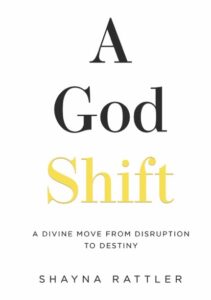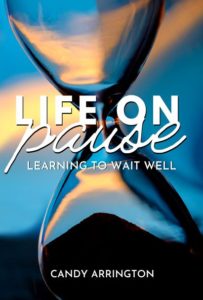 Guest Post By Shayna Rattler
Guest Post By Shayna Rattler
Do you find yourself asking, “what the heck is going on in my life”? Perhaps you are feeling stuck, no longer passionate, or that you’re on the wrong path? Life is full of setbacks, disappointments, and uncertainties. God uses these unexpected circumstances as a means to get your attention and draw you into greater possibility, but most believers are ill-equipped to properly understand or respond appropriately to the disruptions God allows to happen in their life. They also fall into the trap of solely relying on the prayers of others or waiting idly on God for their situation to change, when in fact they have the authority to partner with God to create the life He promises and they desire.
If you are having a tough time overcoming the unexpected circumstances God has thrown your way, you may be in the need of a God shift! A God shift is when a disruption in your life collides with God’s purpose and moves you into new dimensions of possibility. It is a process you go through in order to ultimately get to where God needs you most, and become the person He needs you to be, in order to accomplish what He needs you to do. God is trying to get your attention and invite you into greater possibility. Why? Because another level of destiny awaits you and it’s time to be more, do more, and have more.
So you’re ready to shift, now what?
Here is what it takes to make SHIFT happen…
- Release. Perhaps the most difficult part of shifting is letting go. Some of the most common things we need to release are the life we planned, how we planned it, and who and what we planned it to include. Be more open to what God desires.
- Become. Your shifting season is going to be more about being than doing. Consider it a process of discovery or an opportunity to reinvent yourself. Focus on amplifying your strengths and shedding your weaknesses.
- Move In order to shift successfully, you have to be committed to taking action, even if your steps are laced with uncertainty. It’s time to discover your new possibilities. What are the steps you can take NOW to get you closer to your next? Not sure? Get help so you don’t stay stuck.
- Avoid Seeking Clarity and Confirmation. When God instructs you to take a step and you continue to look for more clarity and confirmation it is an indication you are full of doubt. Doubt and destiny are polar opposites so begin to see opportunities as confirmation that God has answered your prayers.
- Use Your God-Given Authority. When Jesus died He left you with the exact power He had and left with you the ability to use that power in your day to day life. It’s your job to uncover the authority you have as a believer to manifest your desires into existence just as Christ did. In life, especially when you are faced with obstacles, it is important that you have a deep understanding of your identity. The good news is that if you are a believer in God you have power that can overcome anything. The most powerful tool of authority you have access to is your words! Every word you speak MUST be in alignment with what you are praying for. If you find yourself speaking contrary to what you’re praying for, immediately confess that you do not agree with what you spoke and replace the previous declaration with one that proclaims what you desire. Now that you’ve discovered the foundational rules of shifting I hope you see the disruptions in your life from a different perspective. Something that HAD to happen. Fortunately, it happened for you and not to you. What is important now is to continue to dream and commit to where God is taking you. Your life is an incubator for miracles! Keep trusting and keep going.
Shayna Rattler is the author of A God Shift and Founder of A God Shift Movement. She is a minister, speaker, author, podcaster, and TV show host. For more tips to grow your faith, he invites you to download the FREE guide When God Says Shift at www.GodSaysShift.com.



 IT’S AMAZING TO ME how often God uses delays and waiting to bring blessing to those He loves in the stories of the Bible. But I’m struck by the fact that God also often uses these delays to test the hearts of those in waiting to see if they are worthy of the blessing he is about to bestow.
IT’S AMAZING TO ME how often God uses delays and waiting to bring blessing to those He loves in the stories of the Bible. But I’m struck by the fact that God also often uses these delays to test the hearts of those in waiting to see if they are worthy of the blessing he is about to bestow.









